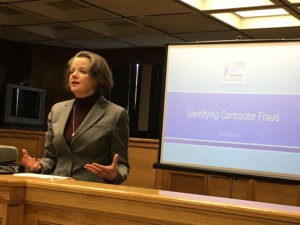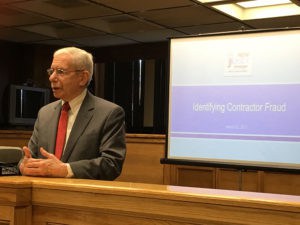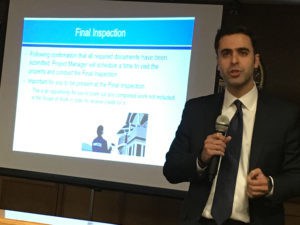
OCEAN COUNTY – Scores of residents laden with documents, bills, photos, invoices and Superstorm Sandy stories attended an information session in Brick’s Town Hall on March 22 to get information and help with contractor fraud and performance issues on their damaged and/or flooded homes.
Brick Mayor John G. Ducey invited the New Jersey Department of Community Affairs (DCA) to hold the 42nd Housing Recovery Information session to help Sandy-affected homeowners participating in the Reconstruction, Rehabilitation, Elevation and Mitigation (RREM) Program, the Low- to Moderate-Income (LMI) Homeowner Rebuilding Program and rental property owners participating in the Landlord Rental Repair Program (LRRP).
Ducey introduced DCA Commissioner Charles A. Richman to the standing-room only audience.

“I’m not going to spend any time telling you how successful this program has been,” Richman said. “I know you are here today because of contractor fraud; it’s hard enough losing your home and now you have been hit twice. It’s a disgrace,” he said.
Commissioner Richman introduced Assistant Director of Legal Issues/Sandy Division Elizabeth MacKay who helped to draft a fraud policy with Housing and Urban Development (HUD).
“In the beginning if you were defrauded, you were pretty much on your own if the funds you were awarded are no longer available because of fraud,” she said.
The federal government will not pay out the same money twice, so the HUD has made other funds available for people to complete their homes, MacKay explained.
“This is not a victim’s compensation fund, this is additional funds so you can complete your home – that’s an important distinction,” she said.
Contractor fraud includes underperformance, use of poor quality materials, inflating costs, abandonment and more.

In order to get the additional funds, victims must have evidence of contractor fraud, file a police report and file a complaint with the DCA with supporting documentation.
The DCA would obtain the resulting charging document (“State vs. Contractor”) from the Division of Consumer Affairs, and a project manager would inspect the property to verify or confirm the damages. The language “Theft by Deception” would be in the charging document, MacKay said.
Then a grant award and amendment would be prepared and a Community Affairs representative would meet with a validated replacement contractor and the applicant.
Applicants may receive additional funds if they agree to filing the complaint, providing documentation, cooperating with state and law enforcement officials, and to returning any funds recovered as the result of criminal actions.
All new contractors must be validated by the project manager, which is very important since if they are not licensed the homeowner would not be eligible for the additional funds.
Assistant Director of Housing Recovery/Sandy Recovery Division David Mazzuca said that if a homeowner is back in their home and the work has been completed, they are no longer eligible to participate in the fraud process.
“Many of us are in the same boat,” said a woman in the audience. “If you’re already in your house ‑‑ you worked, worked, worked ‑‑ and you’re not allowed to move back into your house, why bother working on the house?” she asked. She said many people borrowed from their retirement to complete their homes.
Mazzuca said the DCA has to abide by Federal regulations. “We can’t reimburse you for a project you have already done because you have already figured out a way to do it,” he said.
“This regulation seems ridiculous, but we’re bound by the law. We’ll continue to press and advocate for you,” he added.
Brick’s Shore Acres resident Kevin McGuire, 62, said he attended the information session because he heard there would be funding made available through the RREM program for fraud victims.

“Our home elevation contractor demanded his final payment when there was still 50 percent of work to be done. He lifted the house in one day and then all hell broke loose,” McGuire said as he waited to speak with a DCA representative.
The plumbing, masonry, electrical and HVAC systems under the house were “in shambles and ripped apart” after the house was lifted, McGuire said.
“I refused to give him the final $65,000 payment, which saved us. He threatened us, he tried to place a lien on our house, he said he was going to sue us. I had to hire a lawyer because he pulled off the job,” he said.
The contractor ‑‑ who was licensed by the State of NJ ‑‑ hired a string of different lawyers who contacted McGuire as part of a bullying campaign, he said.
“It was part of his M.O. Later I was able to see a bigger picture of how he operated. His approach has been very effective for him in the past in other states,” McGuire said. “How could the State approve him as a contractor?”
McGuire said he wanted to find out the DCA’s position for people who had completed their houses themselves.
He heard Mazzuca say residents would not be eligible for fraud funds if they were back in their homes, but McGuire said he hoped for a position reversal.
After the presentation, attendees could receive direct assistance with their questions or issues from representatives with the DCA, NJ Division of Consumer Affairs, RREM and LRRP Program Managers and housing counselors from the Sandy Recovery Housing Program.






